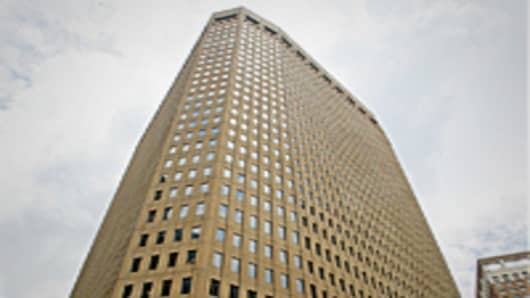Stunning security fraud charges against Wall Street behemoth Goldman Sachs are likely to roil the markets in the short term but unlikely to have longer-lasting effects, experts said.
Though stocks dropped sharply and Goldman in particular surrendered well over 10 percent in share price, the reaction on trading floors and from portfolio managers was that investors would get over the shock in short order.
"Everything we're dealing with happened a couple of years ago," said Dave Lutz, managing director of trading for Stifel Nicolaus in Baltimore. "Ultimately, once this noise has washed out, it's going to translate into one heck of a buying opportunity."
Authorities charged that Goldman, arguably the least hard-hit of major firms when the subprime industry collapsed, packaged mortgages that were secretly designed to fail. Goldman used such short-selling techniques to protect itself against the fallout from toxic mortgages.
Goldman has said it will vigorously defend itself against the charges.
Anton Schutz, portfolio manager at Burnham Financial Services, called the investigation into Goldman "a witch hunt" and politically expedient at a time when Main Street investors are increasingly suspicious of Wall Street business practices.
The prevailing sentiment was that the damage to Goldman and the financial markets would only provide opportunity.
The negative effect for Goldman Sachs will be "significant," but will be a "short-term problem" for the company, said Dick Bove, an analyst for Rochdale Securities. "Whenever the SEC issues these type of charges against a company, there's generally a long, drawn-out legal battle that will change the company's procedures. But it will be a short-term problem. For the long term, it will pass," Bove said.
The announcement also raised questions about timing, considering the struggle in Congress to get financial regulation reform passsed.
"The Goldman news today could cause the same market reaction as (President) Obama’s announcement in January that he would seek to regulate the business practices of our nation's banks," said Thomas H. Kee Jr., president and CEO of Stock Traders Daily.
"From there, the market fell hard. From here, because the technicals and fundamentals are showing resistance at the same time, a similar market decline can follow. In January, the technicals and fundamentals lined up too. More importantly though, many short sellers were lined up then, and they are lined up now. There are plenty of similarities. In January, the button was pushed by Obama. This time, it was pushed by the SEC."
The Goldman fallout may have provided the perfect opportunity for a pullback among those who think the market has become overbought after rallying nearly 80 percent in the past 13 months.
"People have been buying these (financial) names, going long, long, long. What you're seeing today is a reaction to that," said Yousef Abbasi, financial desk analyst at Execution Noble in New York. "Some folks are more than happy—they're pulling off gains on some of these names. They want to get out."
To be sure, it was not all doom and gloom in the markets.
Insurers such as American International Group and MBIA could benefit on belief that should the Goldman case be a trigger point for similar investigations and revelations, insurers would be able to recoup some losses on policies they wrote.
AIG and MBIA wrote insurance policies—called credit default swaps—against the packaged mortgages and thus had to pay off when they collapsed. If fraud is found involving CDS that the insurers underwrote, they could be in line to get their payouts back.
"If any of this is potentially true, there would be direct beneficiaries in the financial space," Abbasi said. "If the mortgages and structures are in fact fraudulent, these guys would be potentially let out of agreements or contracts with Goldman."
Indeed, the question of how systemic the problem is and whether the timing of the Goldman announcement—in the middle of the trading day rather than before or after the bell—vexed investors.
"It's not necessarily the fear for Godlman as much as it could be a ripple effect across the other financial companies," said J.J. Kinahan, chief derivatives strategist at TD Ameritrade. "As we face financial reform in the next few months, what's going to be the long-term implications on trading in general? This has a much bigger implication on the market and every single product going forward."
The announcement also came as options expire for the month, and investors who took out earlier plays on Goldman were left unable to hedge, Kinahan said.
Beyond the implications on stocks and the financials in particular, there also was the question of investor trust.
With public confidence in the market low—judging by the continued trends of light volume and far more money flowing into bonds than stocks—the Goldman charges can't help.
"It's going to take a long time," Stifel's Lutz said. "The market's going to deal with some level of investor uncertainty over this process."



